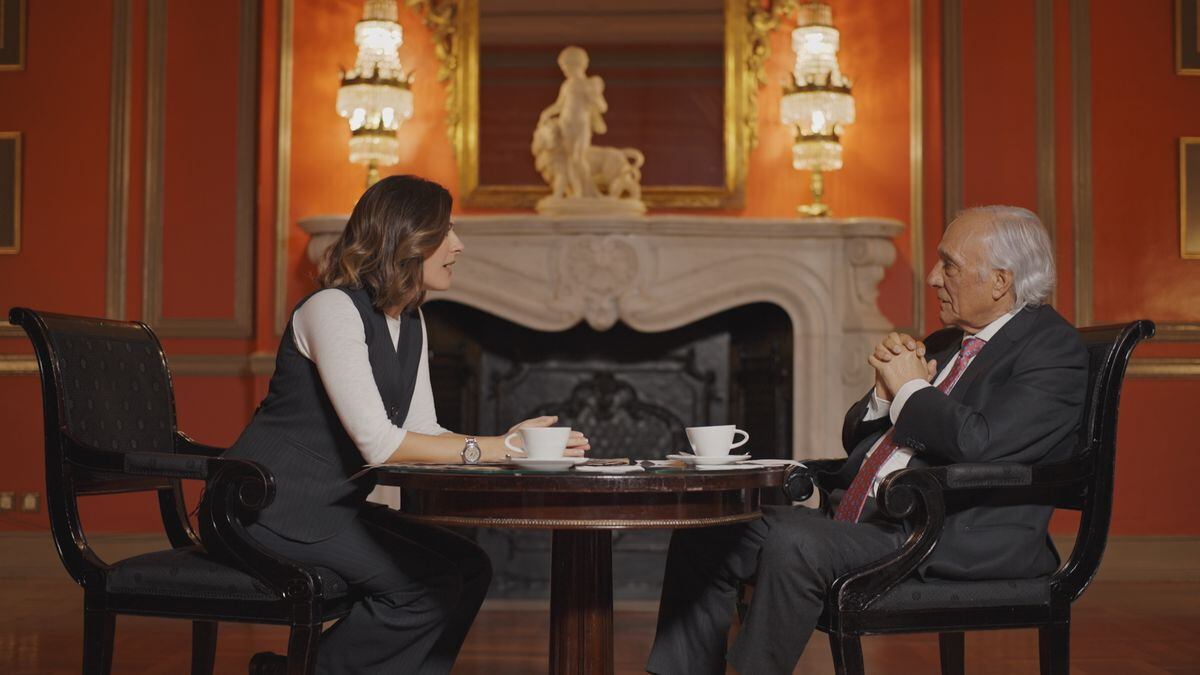“What a privilege to be a journalist!” Rosa Montero's exclamation in the trailer for
En primicia
could have been uttered by any of the 13 protagonists of the docuseries that airs on Thursdays on La 2 (at 11:00 p.m.; also available on RTVE Play). The program not only delves into the career and life of 13 Spanish communicators; He also walks through the recent history of Spain through his eyes, his memories, his work and his words.
For six months, the program interviewed more than 150 people to profile its protagonists. These different voices accompany those of the 13 selected, who had long conversations with fellow journalist Lara Siscar. These talks serve as the common thread of a series that goes further so as not to stop at pure and simple interviews. Those responsible for
En primicia,
produced by RTVE in collaboration with LACOproductora (audiovisual production company of PRISA, publishing company of EL PAÍS), emphasize that these are not biographical programs. “It is not a selection of the indisputable 13, but we wanted to tell journalism through the people who embody the best and diversity of the profession,” explained this Thursday Jacobo Bergareche, executive producer of the docuseries, in the presentation of the program. at the Athenaeum of Madrid.
Bergareche recognizes that the selection of the 13 names that make up this season was not easy. “There were many discussions about who to count on. I wrote to all the journalists I knew and asked them what their must-haves would be. There were a few that appeared on all the lists, the ones with the most gray hair,” says the producer. They also wanted there to be a balance between men and women and for there to be representation of regional journalism and the weight of Barcelona in the sector. In the end, the list looked like this: Raúl del Pozo, Rosa Montero, Manuel Jabois, Pepa Bueno, Federico Jiménez Losantos, Miguel Ángel Aguilar, Rosa María Calaf, Alfredo Relaño, Olga Viza, José Gabriel Mujika, Gervasio Sánchez, Nativel Preciado and Jesús Tangle.
In addition to the content of the long and calm interviews with the protagonists,
En primicia
travels with them to the places where news occurred that marked their professional and personal trajectories or even to their place of origin. “We wanted to review his work and his way of doing things,” says Maxi González, director of the docuseries. To do this, they spent many hours with them before recording, so that, when Lara Siscar sat down to chat with them, they already had all the information beforehand. “Our profession allows, without resorting to fiction, to make it seem like it is,” says Siscar about the stories that the series remembers and unravels.
“I have been lucky enough to have the best job, which is writing,” EL PAÍS journalist Manuel Jabois, the youngest of those selected, says in the series. With him, the series travels to his native Galicia to delve into local, “village” journalism, he says, the journalism of small things. José Gabriel Mujika puts face and emotion to a story that is rarely highlighted, such as the struggle of the Basque journalists who went to the newsroom every day, risking their lives. In the series, Mujika, former director of
El Diario Vasco,
walks through the same streets of San Sebastián that for years he could not walk because he was threatened by ETA. Nativel Preciado meets with Soledad Gallego-Díaz and Julia Navarro to remember their years as journalists in Congress during the Transition. Preciado also goes up to the terrace of the Palace Hotel with Carmen Romero, politician and ex-wife of Felipe González, to remember the PSOE's first victory in a general election. “It's almost like telling the history of Spain over the last 50 years. You realize that your eyes and ears were those of the people who told us,” reflects Jacobo Bergareche.
In another chapter, Olga Viza sits face to face with former president José Luis Rodríguez Zapatero, whom she ordered to silence during an electoral debate with Mariano Rajoy in 2008. Two of the most recognized and admired columnists in the country, Raúl del Pozo, will also share the shot. and Manuel Vincent. With Miguel Ángel Aguilar, a trained physicist, they review how she decided to write to confront the dictatorship and the multitude of processes she has faced for it. Rosa María Calaf highlights the importance of looking at the margins and those who are left suffering when the headlines end. And within sports journalism, in addition to Olga Viza, the series focuses on Alfredo Relaño, former director of Diario AS and who was one of the innovators of the way of broadcasting soccer matches. “He has taught us to look at football differently,” says Siscar.
Pepa Bueno, director of EL PAÍS, travels in the series to Tarifa to show the point where the arrival of boats to Spain was recorded for the first time when she directed the territorial center of Andalusia on TVE. Rosa Montero remembers her denunciation of the mistreatment of prisoners in the Herrera de la Mancha prison and the threats and fear that it cost her. And with the photojournalist Gervasio Sánchez they live some of the hardest moments when they travel to El Salvador to return to the point where a man stepped on an anti-personnel mine that mutilated both of his legs.
“People tell you that making a documentary is very risky because you put yourself in the hands of others, and it is like that, they can destroy you or put you on a pedestal,” Jesús Maraña, another of the series' protagonists, reflected this Thursday. He and the rest of the interviewees know what that is. In the words of Pepa Bueno in the documentary, “deciding what is news is the closest thing to being God.”

